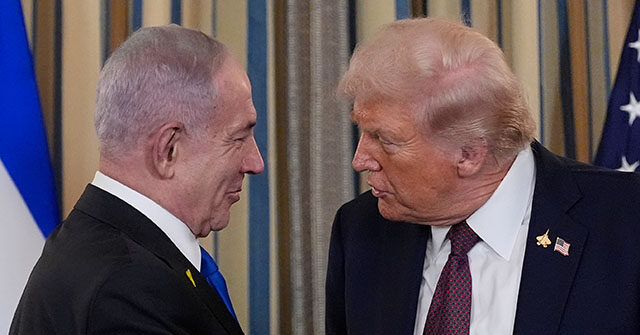Retired United States Army Major John Spencer, one of the world’s leading experts on urban and subterranean warfare, declared Monday that President Donald Trump’s newly unveiled 20-point peace plan for Gaza represents “the most comprehensive proposal put forward to date for both ending the war and setting durable conditions for peace.”
At the White House, President Trump and Israeli Prime Minister Benjamin Netanyahu unveiled the framework, with Trump calling it “a big, big day” and saying it reaches beyond Gaza toward “peace in the Middle East.” Netanyahu praised Trump as “the greatest friend that Israel has ever had in the White House — and it’s not even close.”
Spencer — chair of War Studies at the Madison Policy Forum — wrote on X later Monday, “In my view, the 20-point plan is the most comprehensive proposal put forward to date for both ending the war and setting durable conditions for peace.” He said the blueprint directly meets Israel’s war aims, writing, “It directly achieves Israel’s objectives in the campaign against Hamas: the immediate release of all hostages, the demilitarization and deradicalization of Gaza, the establishment of a Hamas-free governing structure, and long-term security assurances for Israel.”
He drew a line between process and outcome. “What sets this plan apart is that it also offers a genuine path to peace, grounded in conditions that reflect realities on the ground,” Spencer wrote, adding that it “directly addresses the real concerns of the Palestinian people, including assurances against forced displacement, a clear path forward for governance, and international support for rebuilding.”
The urban warfare expert said implementation is built around concrete guardrails: “The plan envisions coexistence tied to tangible steps, an external panel to oversee reconstruction, and the exclusion of the Palestinian Authority until it completes a meaningful reform program.”
On security, Spencer called the architecture decisive. “Crucially, the plan secures at least some level of buy-in from Arab, Muslim, and international partners for the deployment of an international stabilization force in Gaza,” he wrote. “This provision removes the burden from the IDF to act as a long-term stabilizing presence and, more importantly, prevents Hamas from employing its central survival strategy of embedding itself within Gaza’s civilian population.”
He stressed the proposal is built for realities, not wish-casting. “Finally, unlike other proposals, the 20-point plan includes an explicit clause addressing the possibility of Hamas refusing all terms,” Spencer wrote. “This recognition of reality strengthens the plan’s credibility and makes it more resilient to the group’s well-known pattern of obstruction and rejectionism.”
Spencer acknowledged there are still moving parts — but said the unknowns don’t undercut the core. “Yes, many questions remain. Who will sit on the proposed ‘Board of Peace’? What nations will contribute to the International Stabilization Force? Which regional partners will be tasked with ensuring that Hamas and its factions comply with their obligations? Who will validate that the Palestinian Authority has genuinely carried out reforms?” he wrote. “These uncertainties are real, but they do not diminish the plan’s significance. For all the questions it leaves open, the 20-point plan answers far more than any other proposal to date.”
Under the plan, acceptance would trigger the release of all remaining hostages within 72 hours, the disarmament of Hamas, and the group’s exit from governance. Members who renounce violence could receive amnesty to remain in Gaza or safe passage to third countries. If Hamas rejects the proposal, Israel would establish “terror-free” areas that would transfer from Israeli control to a temporary International Stabilization Force composed of Arab and other international partners. The framework also creates a Board of Peace, chaired by Trump, to oversee reconstruction and interim administration; Trump said Hamas would have “no role” in governance — “directly or indirectly.”
At the lecterns following their Oval Office meeting, both leaders made the enforcement stakes explicit if Hamas balks. Trump said, “Israel would have my full backing to finish the job of destroying the threat of Hamas, but I hope that we’re going to have a deal for peace. And if Hamas rejects the deal, which is always possible … as you know, Bibi, you’d have our full backing to do what you would have to do.”
Netanyahu matched the tone. “If Hamas rejects your plan, Mr. President, or if they supposedly accept it and then basically do everything to counter it, then Israel will finish the job by itself. This can be done the easy way, or it can be done the hard way. But it will be done,” he said. “We’d prefer the easy way, but it has to be done. All these goals must be achieved because we didn’t fight this horrible fight, sacrifice the finest of our young men to have Hamas stay in Gaza and threaten us again and again and again with these horrific massacres.”
Netanyahu added that if the international body succeeds in disarming Hamas, “we will have permanently ended the war.” Israel would tie withdrawals to the degree of disarmament and “remain in the security perimeter for the foreseeable future.”
As of Monday evening, Hamas had not publicly responded to the 20-point plan.
Joshua Klein is a reporter for Breitbart News. Email him at [email protected]. Follow him on Twitter @JoshuaKlein.
Read the full article here
